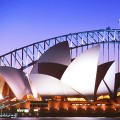Sydney was not completely blacked out Saturday evening, but organizers of "Earth Hour" say they are delighted with the response. Lights on the city's iconic Harbor Bridge were switched off for the hour along with most of those on the famous Sydney Opera House. Tens of thousands of suburban homes joined in. So did hundreds of businesses. Many tower blocks have spent the evening in almost total darkness.
The event has had high-profile support to raise awareness about how to combat global warming. Australian actress Cate Blanchett says Earth Hour shows small changes can make a big difference in climate change.
"It's massive [climate change]. It's very difficult to grasp in all its magnitude and complexities. So I think that the potency of tonight is that it's about a very simple beginning, you know, turning off a switch." Every day millions of lights and computers are left on in deserted offices, apartments and houses.
Environmental activists say that simply switching them off could cut Sydney's greenhouse gas emissions by five percent over the next year. Per capita, Australia is one of the world's largest producers of carbon dioxide and other gases that many scientists believe are helping to warm the Earth's atmosphere, causing climate upset. This Australian, observing Earth Hour in Sydney, says he hopes the event will spur the national government into greater action.
"We're one of the worst, if not the worst, for carbon emissions and it's good to see this effort tonight. So hopefully the government will see it and make some changes." Prime Minister John Howard has refused to sign the international Kyoto Protocol to halt global warming, saying it does not address key issues between developed and developing nations and hurts Australia's coal-driven economy. But he argues Australia is meeting its international emissions obligations in other ways.
A long-standing drought and serious water shortages in Australia have focused much attention on climate change in this election year. Some experts warn higher temperatures could leave this nation of 20 million people at the mercy of more severe droughts and devastating tropical cyclones.

